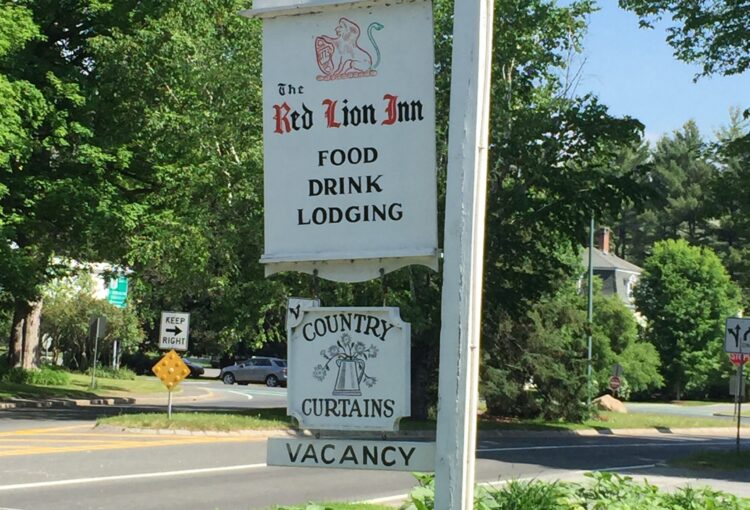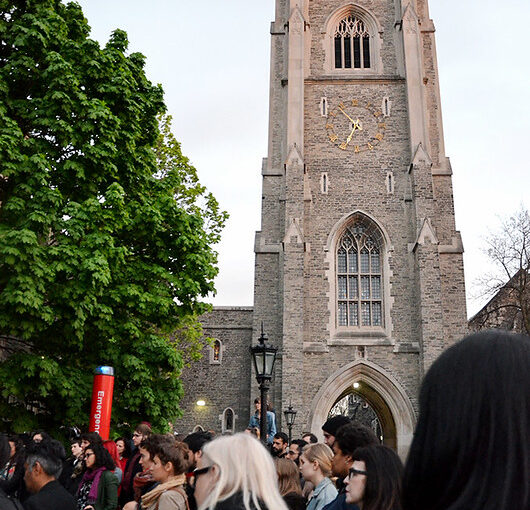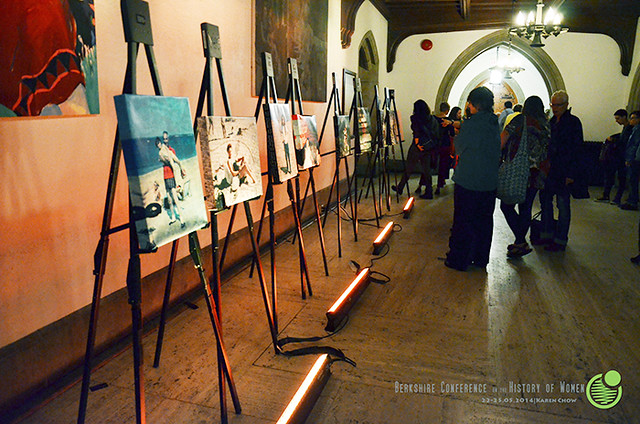Founding and Early Years (1930-1940)

The Red Lion Inn in Stockbridge, Massachusetts, original meeting site for the renamed Berkshire Conference.
The Berkshire Conference of Women Historians was founded in 1930 by Louise Fargo Brown of Vassar College and Louise Ropes Loomis of Wells College. Initially called the Lakeville History Group, after the Connecticut retreat where early meetings were held, the organization became the Berkshire Conference to reflect its new meeting place: the Red Lion Inn at Stockbridge, Massachusetts.
1936: Roots of the Little Berks
These yearly events started as a series of spring weekend retreats, often in the Berkshire Mountains of New England. Initially called the Lakeville History Group, in 1935 the name changed to the BCWH since most of the meetings took place in Stockbridge, Massachusetts. By 1936, these retreats evolved into the organization known today by the nickname “Little Berks.”[1]
Barriers in the Historical Profession (1950-1960)
Although women had been members of the AHA since the nineteenth century, history departments, even at women’s colleges, were dominated by men. In addition, much of the business and conviviality of the historical profession in its early years occurred at hotel “smokers,” private men’s clubs, and an annual retreat held by J. Franklin Jameson in New London, CT. Women were barred from these events, social occasions when graduate students were introduced to prominent colleagues by their mentors. Other forms of exclusion — specifically, women of color who were active in teaching, preservation, and other forms of what we would now call public history — were, unfortunately, not addressed by the founders as they worked to create a place for themselves in the profession.
The Rise of Women’s History (1970)
The Berkshire Conference began to see a larger role for itself after World War II, as women earned the Ph.D. in greater numbers, and renewed their fight to be recognized in the historical profession. Enthusiasm for women’s history among second wave feminists in the 1960s and 1970s made the Berkshire Conference a magnet for a new generation of ambitious scholars. Although women are now accustomed to being honored by all historical societies, that was not the case when the organization established a book prize in 1968 and an article prize in 1971. The list of winners in these early years not only shows the emergence of women’s history as a field, with its own themes and methodologies, but the ways in which women and feminism transformed historical scholarship. At that time, many historians of color were also actively challenging the racial and gender exclusions of mainstream historical narratives—though they were often marginalized in both feminist and professional historical circles.
(Keep Book and Article Prizes on Timeline)
The First Big Berks (1973)

4th Big Berks, Mount Holyoke (1978). Photo credit: Records of the Berkshire Conference of Women Historians, Schlesinger Library, Radcliffe Institute for Advanced Study, Harvard University.
The inaugural “Big Berks” was held in 1973 at Douglass College, Rutgers University, resulting in the first edited collection in the field of women’s history, Clio’s Consciousness Raised: New Perspectives on the History of Women (Harper & Row, 1974), edited by Lois Banner and Mary S. Hartman. Perhaps the excitement of that volume propelled the Berkshire Conference into a second scholarly meeting the following year at Radcliffe College. The fast-growing organization soon switched to a biennial model, and then to triennial meetings after 1978. Like many second wave feminist organizations, these conferences also featured a women’s dance on the final evening of the conference, which continues to this day.
The Little Berks Continues and Beloved Traditions (1970s and 1980s)

Little Berks, Red Lion Inn (2000). Photo credit: Records of the Berkshire Conference of Women Historians, Schlesinger Library, Radcliffe Institute for Advanced Study, Harvard University
The women of the 1970’s and 1980s also shifted their meetings to the Mohonk Mountain House in New Paltz, NY. An old tradition dating back to the founders dictated that the first member to spot a trillium, a rare and delicate New England plant, would be awarded a glass of bourbon at the evening cocktail hour. Mohonk presented a challenge to this tradition since, for many years, it was a “dry” hotel. This proved only a small barrier to conviviality, however, and it is said that the bourbon was still awarded – along with cocktails doled out to others — but more privately, and from a bottle smuggled into the hotel in a suitcase.
Triennial Model Adopted (1978)
Incorporation and Membership Growth (1981)
In 1981, The Berkshire Conference was incorporated in the State of Maryland as a 501(3) c, allowing the organization to create an endowment to support our activities and prizes from membership fees, any profits from the triennial conference, and tax-deductible donations.
1982: Bunting Fellowships Established
The Berkshire Conference also has a long history of creating cooperative relationships with other organizations that advance the cause of women in the historical profession. Between 1982 and 2001, the Berkshire Conference awarded one of the prestigious Bunting Fellowships at the Radcliffe Institute, Harvard University. In 1982, in cooperation with the Coordinating Council of Women in the Historical Profession, the Berks began awarding a graduate fellowship, a practice that continues to this day.
1989 -1993 A Growing Scholarly Network
From 1989 onward, the Big Berks continued its triennial rhythm, drawing together scholars of women’s, gender, and sexuality history from across the globe. The 1990 conference was hosted at Douglass College, Rutgers University—in continuity with its 1973 origins—and featured Laurel Thatcher Ulrich and Jo Burr Margadant as winners of the inaugural Berks Book.
1993: International Focus at Vassar
In 1993, Vassar College hosted the conference with a concerted emphasis on international participation—reflecting the field’s expanding global reach. Vassar College hosts the conference with a concerted emphasis on international participation, reflecting the field’s expanding global reach.
2014: First International Big Berks
The conference maintained its international trajectory with the 2014 Big Berks held at the University of Toronto, marking the first time the event took place outside the United States. Susan Yohn serves as President (2014-2017).
2017-2020 Co-Presidential Leadership
2020-2022 Virtual Berks Era
Originally planned for Johns Hopkins University, the conference shifts to a fully virtual format due to the pandemic, featuring the theme “Recovery as Resistance.” Barbara Molony and Judy Tzu-Chun Wu begin their co-presidency (2020-2023). Throughout this period, the Little Berks annual meetings remained a vital forum for members, featuring panels, mentorship, and institutional business. From 2020 to 2022, events shifted to fully virtual formats with themes like “Recovery as Resistance” (2020) and “Reproductive Justice in a Post‑Roe v. Wade America” (2022).
 2023: The Berks Celebrates a Milestone and Grapples with the Urgency of Racial Accountability
2023: The Berks Celebrates a Milestone and Grapples with the Urgency of Racial Accountability
The fiftieth-anniversary Big Berks, held in person at Santa Clara University in 2023 after the virtual 2020 conference, was intended to be a celebratory milestone in the organization’s history. Instead, it became a moment of reckoning. During the opening plenary, a co-founder made a racist, homophobic, and Islamophobic remark that sparked immediate and widespread condemnation. The Berkshire Conference responded with a public apology that explicitly named the harm and condemned the comment. More significantly, the Board acknowledged that the incident reflected not only the views of an individual but a broader, ongoing pattern of racial harm within the organization and the field of history. In response, the Berks committed to a series of structural reforms, including updated guidelines for moderators and sessions, greater transparency in governance, changes to bylaws to enhance democratic participation, and new initiatives to support and amplify the voices of scholars of color and LGBTQ+ colleagues. This moment catalyzed an essential shift, positioning accountability and equity at the center of the Berks’ future work.
2023-2025: Charting a New Path: Leadership Change and Organizational Renewal
 In recent years, the Berkshire Conference has undergone significant leadership changes amid a broader process of institutional reflection and restructuring. From 2020 to 2023, co-presidents Barbara Molony and Judy Tzu‑Chun Wu led the organization through the challenges of the COVID-19 pandemic and a virtual conference cycle. They were succeeded by co-presidents Rhonda Williams and Ji‑Yeon Yuh for the 2023–2026 term, with Traci Parker serving as Vice President. However, in 2026, the trustees voted to remove Williams and Yuh from their positions following the unsuccessful attempt to host the conference at Northwestern University and other organizational challenges. Alongside this leadership shift, the board announced that the 2026 Big Berks would be paused. The organization is now engaged in a critical process of reevaluating its structure, leadership model, and long-term sustainability to ensure a more inclusive and resilient future.
In recent years, the Berkshire Conference has undergone significant leadership changes amid a broader process of institutional reflection and restructuring. From 2020 to 2023, co-presidents Barbara Molony and Judy Tzu‑Chun Wu led the organization through the challenges of the COVID-19 pandemic and a virtual conference cycle. They were succeeded by co-presidents Rhonda Williams and Ji‑Yeon Yuh for the 2023–2026 term, with Traci Parker serving as Vice President. However, in 2026, the trustees voted to remove Williams and Yuh from their positions following the unsuccessful attempt to host the conference at Northwestern University and other organizational challenges. Alongside this leadership shift, the board announced that the 2026 Big Berks would be paused. The organization is now engaged in a critical process of reevaluating its structure, leadership model, and long-term sustainability to ensure a more inclusive and resilient future.

